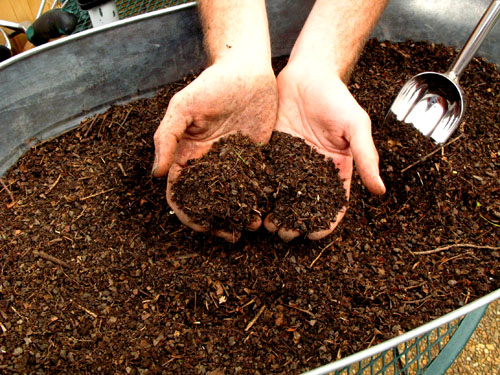"Can you show me how to do the compost bin?" Megan, my roommate, asked yesterday as she pointed to the compost bag filled with vegetable scraps and coffee grounds that I'd hung (conveniently, I thought) from a knob on our kitchen counter. "It's, um, leaking all over the floor."
"I'll take it out!" I chirped, excited to lay down another layer of scrap on my growing pile of decomposition.
It's my masterpiece.
I slipped on some shoes and walked out to the side of the house, where my compost bin sits in partial shade. Megan followed, eyeing the leaky bag in my hand.
I removed the lid of my bin and dumped the bag of what would otherwise be considered "trash" onto the mostly rotten, stinking pile.
Megan took a step back. "So, uh, what's the point of composting, anyway?"
I realized I hadn't really explained the purpose of my growing work of art, and I'm willing to admit: it's not the prettiest (or the most pleasant smelling) thing I keep myself busy with.
But the truth of the matter is that composting is one of the
best activities for living a green and sustainable lifestyle. There are so many benefits to having a compost bin at home, whether you are have a backyard garden or not.
In this post, I'll be outlining some basic types of compost systems and listing the reasons for setting one up.
First and foremost,
what is composting?
Composting is the process of turning decomposed organic materials into nutrient-rich soil, often used as garden fertilizer, known as
compost.
Reasons for Composting
Composting reduces the amount of waste you send to the landfill. Let me repeat that:
compost reduces the amount of "waste" you send to the landfill. What our society often considers "waste" isn't waste at all— it can be repurposed. You can compost more than just fruit and vegetable scraps.
Paper, cardboard, scrap wood, sawdust, yard trimmings, leaves, egg shells, and coffee grounds are just a few examples of things you can recycle.
Why should you care about landfill waste? Landfills get a bad rap. They're not bad in themselves, but it's the
amount of waste that gets sent to them that's bad. All the stuff in landfills represents a loss to the environment and the economy. As much as 50% of landfill space is taken up by paper, something that can be broken down naturally in your backyard. Biodegradable materials like paper and vegetable waste don't break down naturally in landfills because they require other living organisms to fully decompose and return to nature as the building blocks for new life. Landfills are simply packed with too much "garbage" for this to happen.
Composting turns your waste into a natural product. You won't need to buy as much (if any) fertilizer for your garden once you start a compost system. And if you don't garden, there's plenty of people who do, people who will be happy to take it off your hands.
Composting provides you with a lesson about the bad habits of our society and lets you have an active hand in breaking them. We're a materialistic creature, we humans, and it's a part of who we evolved to be. But there's ways to consume without
overconsuming, and leaving a trail of waste behind us for the earth? future generations? to clean up. Let's break the cycle now! If you think that because you're just one person, you won't make much of a difference, I'm here to tell you that you're wrong. Our lives are entirely made up of the decisions we make, and those decisions impact others we meet. You never know how your actions can potentially influence someone else.
Are you convinced yet? Great!
Now, we'll talk about the types of compost systems.
Types of Compost Systems
Heap: A heap is the most basic outdoor composting method. It costs almost nothing and is super low maitenenence. There are some downsides, though. Because a heap is an open air system, you lose heat, which means a slower decomposition rate. It's also unsightly, so unless you have a corner of the yard where you can tuck it and let it be, I'd invest in a different system.
Plastic Holding Bins: This is the kind of compost system I have. They're a bit more expensive, but they're compact and prevent animals from getting into your pile.They're easy to move around and the plastic reduces moisture loss. On the flipside, though, is the limited holding capacity. Plastic bins won't work for bigger gardens.
3-Bin Turning System: These are the Rolls Royce of outdoor compost systems. They produce compost
fast, and they produce a lot of it. They're perfect for large yards and gardens. This system takes a bit of work when building, but the result is durable and long-lasting. On the downside, it requires a bit more space and commitment, because you have to follow strict composting guidelines in order for this to work.
Worm Bin: A great indoor alternative, worm bins are perfect for apartment dwellers or people who don't have a ton of outdoor space to work with. A longtime friend who now lives in New York actually has a worm bin compost system at the bottom of her pantry. As unappealing as this sounds, it's actually a far better system than dragging your waste to the curb to rot while awaiting garbage pickup. These are small and inexpensive to maintain, and don't require too much commitment or extra work.
So there you have it, an introduction to the reasons for and systems of composting! Please share your experiences with and/or any tips for composting in the comments.
Additionally, please comment and let me know if you'd like additional information on any of the systems I've talked about in this post. I'm happy to help with questions or concerns!



















































